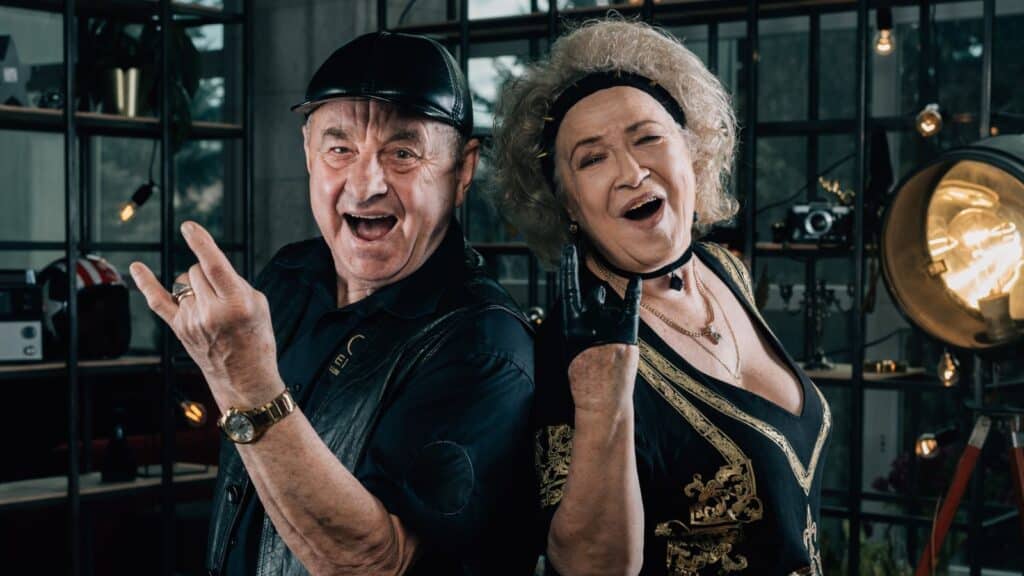The Swinging 60s wasn’t just an iconic decade for music and fashion; it provided countless quirky phrases. While slang such as “hip” and “far out” are foreign terms to today’s youth, the linguistic legacy of the 60s lives on through Baby Boomers. Here are 23 nostalgic slang phrases from the 60s that will send you back in time.
“Word From The Bird”

Anyone who grew up in the 60s will remember jamming away to “Surfin’ Bird,” a groovy track that gave way to a popular phrase. If someone prefaced a fact or story with “word from the bird is…”, they wanted to assure you of their honesty.
A “Wet Rag”

If someone called you a “wet rag” in the 60s, they were playfully questioning your actions. As the wording suggests, someone treated to this insult was being called out for boring behavior. For instance, “I can’t believe you’re not coming out tonight. You’re such a wet rag!”
“Thongs”

Before they were flip flops, these casual summer sandals were known as “thongs,” which means something entirely different today. But while North America adopted the term “flip flop” by the end of the 1960s, Australians prefer their original name.
“Hip”

If trendy youngsters called somewhere “hip” in the 1960s, you knew it was the place to be. Derived from the word “hippie,” this adjective was the ultimate bohemian compliment that any bar, club, or restaurant could hope to receive.
“Far Out!”

Nearly always exclaimed, anything “far out” was the height of cool for 1960s hippies. Adopted from jazz culture, this phrase referred to something progressive, fresh, and achingly on-trend.
“Cool Cat”

This phrase is another homage to 1940s jazz culture, which experienced a new wave of popularity in the 1960s. A “cool cat” was someone fashionable, attractive, and often anti-establishment.
“Square”

The term “square” referred to someone who was the antithesis of a “cool cat,” which was old-fashioned, up-tight, and essentially uncool. Originally reserved for someone out of touch with musical trends, by the end of the 60s, anyone traditional was labeled a “square.”
“Come On Snake, Let’s Rattle”

This phrase had two possible meanings depending on the context. You could approach someone on the dance floor and ask them to boogie with a “Come on snake, let’s rattle.” Or, it could be used when challenging someone to a fistfight.
“Grody”

If someone or something was “grody,” or even worse, “grody to the max,” it meant they were disgusting. Encountering an old homeless man with yellow teeth would definitely be “grody,” yet so would eating butter straight from the pack.
To “Dig” Something

Asking someone, “Can you dig it?” meant you were wondering if they understood your point of view. Young people in the 1960s were always looking for inventive ways to gauge someone’s opinion or express their own. You could also “dig” the vibe of a cocktail vibe or future plans that sounded pretty groovy.
Dont “Flip Your Wig”

Imagine you’re conversing with someone who is rapidly losing their cool. Instead of telling them to calm down, you’d probably chide them with, “Hey, don’t flip your wig!” Wigs were becoming increasingly popular among older people in the 60s, and youngsters would take the opportunity to turn this trend into humor.
“Bread”

There were many ways of referring to money in the 1960s, but the most popular was “bread.” If someone asked you to give them “a little bread,” they were probably referring to cash rather than a loaf of sourdough.
“Gimme Some Skin”

This phrase was a cooler way of asking someone for a casual handshake or fist bump. “Gimme some skin” was a popular term among 1960s hippies, who were trying to shake off the old-fashioned vernacular of their parent’s generation.
“Hang Loose”

Another staple of 60s hippy culture, the term “hang loose,” referred to the need to relax and take some time out to chill. If someone was told to “hang loose,” they needed to stop taking things so seriously and wind down.
“Bogart”

Humphrey Bogart was a Hollywood icon whose last name morphed into an insult. If someone was being a “bogart,” you could bet they were acting with aggression or selfishness. For instance, if someone exclaimed, “Don’t bogart that joint!” it meant you were hogging their marijuana.
“Flower Power”

This phrase referred to the counter-culture pacifist movement of the 1960s. The Flower People, or Flower Children, were strictly anti-war and would regularly meet in peaceful protest against the Vietnam War.
“Grungy”

Later used to describe an aesthetic trend, calling someone “grungy” in the 1960s was an entirely different matter. Similar to “grody,” if someone was “grungy,” it meant they were unwashed, dirty, and generally unkempt.
“Meanwhile, Back At The Ranch”

This phrase was used in conversation as a segue for someone to talk about where they lived and what was going on there. Unless they lived on a ranch, the phrase simply referred to wherever someone called home. They might say, “Meanwhile, back at the ranch, we’re fitting our new kitchen.”
“Groovy”

Emerging from the Jazz Age, “groovy” became a much-loved phrase of the 1960s, and it is still in use today. This iconic adjective described anything cool, hip, and generally excellent. Austin Powers might have resurged its popularity, but “groovy” had its time way before that film was released.
“Amped”

If someone was excited and full of energy about something, they were considered “amped” for the occasion. For example, someone could be “so amped” for a concert they were due to attend or for a meal they were looking forward to.
Maybe It’s Just “Not Your Bag”

If something wasn’t “your bag,” it meant you simply weren’t into it, and this was usually accepted without question. By 1960, this phrase was used by people of all ages and was an easy way to describe someone’s opinion or disposition.
“Marvy”

The word marvelous is quite long and can sometimes get caught on the tongue, which is why 1960s youngsters shortened it to “marvy.” Anything considered positive could be “marvy,” but it could also be used in a negative, more sarcastic tone.
“Let’s Split”

Meaning to depart suddenly, “let’s split” was a staple of noir movies and was used by mobsters to indicate a quick getaway. If someone said, “Come on, let’s split”, you usually wouldn’t want to hang around.
19 Grim Realities of Dating After 50 That Are Often Overlooked

19 Grim Realities of Dating After 50 That Are Often Overlooked
26 Things That Will Be Extinct Because Millennials Refuse to Buy Them

26 Things That Will Be Extinct Because Millennials Refuse to Buy Them
24 Outdated Slang Terms You Absolutely Shouldn’t Be Using Anymore

24 Outdated Slang Terms You Absolutely Shouldn’t Be Using Anymore
25 Hardest Parts About Getting Older That No One Ever Talks About

25 Hardest Parts About Getting Older That No One Ever Talks About



